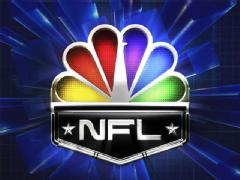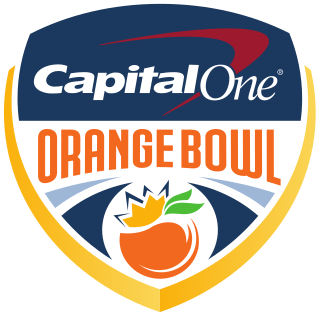Related Research Articles

The Fiesta Bowl is an American college football bowl game played annually in the Phoenix metropolitan area. From its beginning in 1971 through 2006, the game was hosted in Tempe, Arizona at Sun Devil Stadium. Since 2007, it has been held at the State Farm Stadium in Glendale, Arizona.

The Rose Bowl Game is an annual American college football bowl game, usually played on January 1 at the Rose Bowl in the Los Angeles suburb of Pasadena, California. When New Year's Day falls on a Sunday, the game is played on Monday, January 2. The Rose Bowl Game is nicknamed "The Granddaddy of Them All" because it is the oldest currently operating bowl game. It was first played in 1902 as the Tournament East–West football game, and has been played annually since 1916. Since 1945, it has been the highest attended college football bowl game. It is a part of the Pasadena Tournament of Roses Association's "America's New Year Celebration", which also includes the historic Rose Parade.

George Allen "Pat" Summerall was an American football player and television sportscaster who worked for CBS, Fox, and ESPN. In addition to football, he also announced major golf and tennis events. In total, he announced 16 Super Bowls on network television, 26 Masters Tournaments, and 21 US Opens. He also contributed to 10 Super Bowl broadcasts on CBS Radio as a pregame host or analyst.

Matthew Edward Vasgersian is an American sportscaster and television host. Vasgersian is a play-by-play announcer for ESPN's coverage of Major League Baseball, as well as a studio host for MLB Network. In the past, he has served as an announcer for Fox Sports' National Football League & Major League Baseball coverage, NBC Sports' coverage of the Olympic Games, and NBC Sports' coverage of the short lived XFL. He formerly called play-by-play for the Milwaukee Brewers and the San Diego Padres.

The NFL on NBC is the branding used for broadcasts of National Football League (NFL) games that are produced by NBC Sports, and televised on the NBC television network in the United States.
College football on television includes the broad- and cablecasting of college football games, as well as pre- and post-game reports, analysis, and human-interest stories. Within the United States, the college version of American football annually garners high television ratings.
ESPN Events is an American multinational sporting event promoter owned by ESPN Inc. It is headquartered in Charlotte, North Carolina, and shares its operations with SEC Network and formerly with ESPNU. The corporation organizes sporting events for broadcast across the ESPN family of networks, including, most prominently, a group of college football bowl games and in-season college basketball tournaments.
Megacast, formerly known as ESPN Full Circle, is a multi-network simulcast of a single sporting event across multiple ESPN networks and services—with each feed providing a different version of the telecast making use of different features, functions or perspectives. Eleven networks and services have been involved with these specials, including ESPN, ESPN2, ESPNEWS, ESPN Classic, ESPNU, ESPN Radio, ESPN Mobile, ESPN3/WatchESPN, ESPN.com, ESPN Brasil, TSN/RDS, ESPN International and ESPN Deportes.

Thursday Night Football is the branding used for broadcasts of National Football League (NFL) games that broadcast primarily on Thursday nights. Most of the games kick off at 8:20 p.m. Eastern Time, but games in the package also air occasionally on Saturdays in the later portion of the season, as well as a single Sunday morning game from London in the NFL International Series.
When the Bowl Championship Series was formed in 1998, television coverage was consolidated on the ABC Television Network. Beginning with the 2006 season, the Fox Broadcasting Company took over television coverage of the Sugar Bowl, Orange Bowl, and Fiesta Bowl games. ABC retained the Rose Bowl game under a separate contract. Radio broadcast coverage has been on ESPN Radio.

ESPN College Football on ABC is the branding used for broadcasts of National Collegiate Athletic Association (NCAA) Division I Football Bowl Subdivision (FBS) college football games that are produced by ESPN, and televised on the American Broadcasting Company (ABC) in the United States.
The National Hockey League has never fared as well on American television in comparison to the National Basketball Association, Major League Baseball, or the National Football League, although that has begun to change, with NBC's broadcasts of the final games of the 2009, 2010, 2011, and 2013 Stanley Cup Finals scoring some of the best ratings ever enjoyed by the sport on American television.

The Orange Bowl is an annual American college football bowl game played in the Miami metropolitan area. It has been played annually since January 1, 1935, making it, along with the Sugar Bowl and the Sun Bowl, the second-oldest bowl game in the country, behind the Rose Bowl. The Orange Bowl is one of the New Year's Six, the top bowl games for the NCAA Division I Football Bowl Subdivision.

Fox College Football is the branding used for broadcasts of NCAA Division I FBS college football games produced by Fox Sports, and broadcast primarily by Fox, FS1, and FS2.

The College Football Playoff (CFP) is an annual postseason knockout invitational tournament to determine a national champion for the National Collegiate Athletic Association (NCAA) Division I Football Bowl Subdivision (FBS), the highest level of college football competition in the United States. Four teams play in two semifinal games, and the winner of each semifinal advances to the College Football Playoff National Championship game.
NBC made history in the 1980s with an announcerless telecast, which was a one-shot experiment credited to Don Ohlmeyer, between the Jets and Dolphins in Miami on December 20, 1980), as well as a single-announcer telecast, coverage of the Canadian Football League during the 1982 players' strike, and even the first female play-by-play football announcer, Gayle Sierens.
On March 12, 1990, at the NFL's annual meeting in Orlando, Florida, the league new ratified four-year television agreements for the 1990 to 1993 seasons involving ABC, CBS, NBC, ESPN and TNT. The contracts totaled US$3.6 billion, the largest package in television history. This contract saw each network having rights to one Super Bowl telecast as part of the package. The fourth Super Bowl (XXVIII) was up for a separate sealed bid. NBC won the bid, and since they were last in the rotation for Super Bowl coverage in the regular contract, ended up with two straight Super Bowls. CBS is the only other network to televise two Super Bowls in a row. NBC, which had held XXVII, was the only network to bid on XXVIII. Previously, the league alternated the Super Bowl broadcast among its broadcast network partners, except for Super Bowl I; CBS broadcast Super Bowl II, then the league rotated the broadcast between CBS and NBC until 1985 when ABC entered the rotation when that network broadcast Super Bowl XIX.
Sports programming on the American Broadcasting Company is provided on occasion, primarily on weekend afternoons; since 2006, the ABC Sports division has been defunct, with all sports telecasts on ABC being produced in association with sister cable network ESPN under the branding ESPN on ABC. While ABC has, in the past, aired notable sporting events such as the NFL's Monday Night Football, and various college football bowl games, general industry trends and changes in rights have prompted reductions in sports broadcasts on broadcast television.
References
- ↑ Disney makes $125 million BCS bid. Variety, November 12, 2008
- ↑ Reid Cherner & Tom Weir, "Rose Bowl headed to ESPN" Archived 2009-06-15 at the Wayback Machine , USA today, June 12, 2009
- ↑ John Ourand and Michael Smith (November 9, 2012). "ESPN homes in on 12-year BCS package". Sports Business Daily. Retrieved July 24, 2013.
- ↑ Hiestand, Michael (2009-11-29). "ESPN/ABC spreads its bowl talent". Usatoday.Com. Retrieved 2016-10-10.
